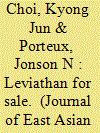| Srl | Item |
| 1 |
ID:
117720


|
|
|
|
|
| Publication |
2013.
|
| Summary/Abstract |
Successive governments have sought to address the enduring problem of corruption in Macao. Yet the institutional framework for dealing with corrupt practices has singularly failed to live up to political promises and public expectations of clean government. The Ao Man-long case, in which a former Secretary for Transport and Public Works was found guilty of corrupt practices involving an estimated $800 million (about US$100 million), rocked public confidence in the anti-corruption institutions and gave credence to the widely-held view that an expanded gaming industry had provided more opportunities for illicit behavior. Diagnosing the causes of failure suggests that neither a lack of resources nor the absence of rules serves to explain the continuing high levels of bureaucratic corruption. Rather the explanation for the failure of the institutional framework lies in the content of the rules and the way in which they are implemented. While this situation continues to persist, it is unlikely that the problem of bureaucratic corruption will be resolved or that its wider impact on the government's legitimacy will be reduced.
|
|
|
|
|
|
|
|
|
|
|
|
|
|
|
|
| 2 |
ID:
179557


|
|
|
|
|
| Summary/Abstract |
We argue that the 2014 Sewol ferry disaster in South Korea, in which 304 passengers perished, was a result of the mode and process of privatization of South Korea's maritime police and rescue services. Through the development of a nuanced theory of privatization and use of a novel conceptualization of corruption, coupled with empirical analysis, our study shows that the outcome was symptomatic of a wider trend of systematic bureaucratic rent-seeking. A pro-active private sector ready to capitalize on the opportunity, in conjunction with a permissive political environment, resulted in a reduction of state capacity, with devastating consequences.
|
|
|
|
|
|
|
|
|
|
|
|
|
|
|
|